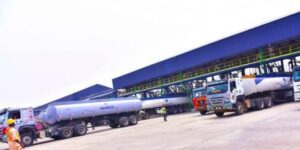
Nigeria spends N1.79 trillion on importation of petrol, diesel in Q4,2022
Nigeria spent a total of N1.79trillion on the importation of Premium Motor Spirit (PMS) and Automotive Gas Oil (Diesel) in the fourth quarter of 2022 (Q4,2022), consisting of N1,558.49billion (Petrol) and N220.47 billion (Diesel) and representing a share of 33.16% of ₦5.37 trillion being total spent on importing different commodities into Nigeria in the period under review.
This was one of the key highlights revealed in the Foreign Trade report recently released by the National Bureau of Statistics (NBS) for the fourth quarter of 2022, obtained by EnergyDay.
According to the report the two refined petroleum products are commodities with the largest values of imported products in the fourth quarter of 2022.
The figure however showed that Nigeria spent more on the importation of PMS in Q4,2022 (N1.56 trillion) compared with N1.44 trillion spent in Q4,2021.
The country also spent more on the importation of other refined petroleum products (AGO, Kerosene others) in Q4,2022, with an estimate of N289.8 billion compared with N226.13 billion spent on the products in Q4,2021.
Besides PMS and AGO other refined products imported into the country, N52.56 billion was also spent on the importation of Kerosine type jet fuel.
The report showed that products were majorly imported from China, Belgium, India, The Netherlands, and the United States of America, which comprised the top five countries of origin of imports to Nigeria in the period under review.
However, the report showed that the values of imports from the top five countries amounted to ₦2,993.67 billion representing a share of 55.82% of the total value of imports.
Meanwhile, the value of total imports stood at ₦5,362.83 billion in the fourth quarter of 2022, this showed a decrease of 15.46% when compared with the value recorded in Q3, 2022 (₦6,343.53 billion) and also declined by 9.73%, compared to the value recorded in the corresponding quarter of 2021 (₦5,940.58 billion).
The value of all refined petroleum products imported to Nigeria in the fourth quarter of 2022 stood at ₦1.88 trillion indicating a decline of -18.18% from the value recorded in Q3, 2022 (₦2,293.79 billion), but increased by 10.40% compared to the value recorded in the corresponding quarter of 2021 (₦1,700.13 billion).
The value of refined products imported from Europe in the period under review was N1.28 trillion, Asia N507.48 billion, United States N50.45 billion and Africa N42,706.07, with a total estimate of N1.88 trillion.
Using the Standard International Trade Classification, the top-ranked group import was refined petroleum products (mineral fuels) with ₦1.88 trillion (35.02% of total imports), this was followed by “imported machinery & transport equipment” with ₦1,283.94 billion (23.94% of total imports) and “chemicals & related products” with ₦694.68 billion (12.95% of total imports).
Nigeria has continued to spend more of its forex on the importation of petroleum products into the country for many years.
Experts have expressed hope that the import bills especially for refined petroleum products would reduce as soon as Dangote Refinery and Nigeria’s four crude oil refineries, with a combined nameplate capacity of 445,000 barrels per day, commence production before the end of 2023.
Godwin Emefiele, Governor of the Central Bank of Nigeria, during an interview at the International Monetary Fund meeting in Washington Dc, United States last year, suggested that the commencement of Dangote Refinery will reduce Nigeria’s import bill on petroleum products and other commodities by 40 per cent.
Emefiele said, “With Dangote Refinery coming up with the 650,000 barrels per day, hopefully by the end of the year, that will reduce the demand for foreign exchange that normally will go for the importation of petroleum products.
“I have also said that between the importation of refined petroleum products and other products like rice, sugar, and wheat, we spend close to about 40 percent of the foreign exchange that is needed to fund imports into Nigeria.”


